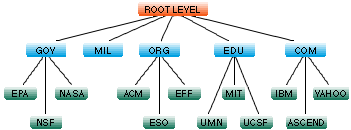DNS (Domain Name System) Server
DNS is a TCP/IP service that lets you specify a symbolic name instead of an IP address. A symbolic name consists of a user name and a domain name in the format username@domain name. The user name corresponds to the host number in the IP address. The domain name corresponds to the network number in the IP address. A symbolic name might be steve@crocker.com or joanne@cal.edu. The domain identifier is the last part of the domain name, and identifies the type of organization to which the host belongs.
Through DNS, your Internet Service Provider can maintain a database of network numbers and corresponding domain names. When you use a symbolic name, the DNS translates the domain name into an IP address, and sends it over the network. When your Internet Service Provider receives the message, it uses its own database to look up the user name corresponding to the host number.
An important aspect of DNS is that address information is stored at many locations -- the data is stored in the form of a distributed, hierarchical database. You use a domain name server each time you visit a web site, log onto an FTP server, or use telnet. In each case you could use the IP address of the destination host and achieve the same results.
For example, if you know that the IP address of the Acme company is 255.100.12.10, to visit Acme's web site you could enter 255.100.12.10 on the 'open location' input field of your favorite web browser. This invokes the Hyper Text Transport Protocol (http) server of your Internet Service Provider and points it to Acme. Since the request was initiated from a browser, the http server responds to the request by presenting the web page.

